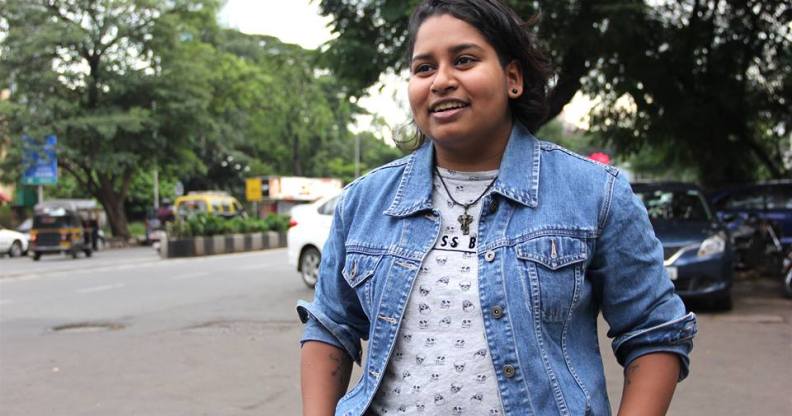Pansexual woman’s heartbreaking story of sexual abuse goes viral

(Facebook/HumansofBombay)
The heart-wrenching abuse story of a pansexual woman has gone viral.
The Facebook page Humans of Bombay recently posted a story featuring a pansexual teenager speaking out about her experiences of coming out, acceptance and sexual abuse.
A spin-off of the successful Humans of New York page, Humans of Bombay has become hugely popular, and currently has over 700,000 fans.

(Facebook/HumansofBombay)
Despite this huge audience, the Mumbai woman was brave enough to share details of her years-long experience of sexual abuse, as well as her coming out story.
“I’m Pansexual — which means I’m attracted to all genders,” the woman – who did not give her name, as is common on the page – explained.
“I am also genderqueer. On some days I’m more masculine and on others I’m more feminine, but on all days, I’m very queer!”
She added: “I often questioned if the queer part of my identity was because of the abuse, but after years of psychotherapy and intensive healing, I realised I didn’t choose to be queer — it’s inherently a part of me.”
She described how deeply this abuse affected her and her perception of other people.
“For the longest time, I feared men and experienced overwhelming anxiety, but I’m not afraid anymore because I know that the fault was never mine,” she said.
This woman’s story of sexual abuse is one of many which queer women have experienced, often at the hands of straight men.
The abuse is often an attempt by the perpetrator to ‘cure’ the victim of their same-sex desires by forcing them to engage in heterosexual sex.
It’s commonly known as ‘corrective rape.’

(Getty)
In Stephen Fry’s 2013 BBC documentary Out There, he met a lesbian living in Uganda who was a survivor of corrective rape.
Tragically, the rape left her both pregnant and HIV-positive, and of course, had no impact on her sexual orientation.
Another victim of corrective rape, Angeline Jackson, spoke to Marie Claire in 2016 about her experience of being raped by a man in Jamaica after being lured by him using a lesbian chat room.
As a result of her horrific experience, Jackson became an LGBT activist and co-founded a non-profit group, Quality of Citizenship Jamaica, which helps lesbian women and girls who have experienced abuse.

Stephen Fry’s eye-opening documentary revealed the horrors of “corrective rape” in Uganda
A study conducted in 2010 by the CDC found that 44% of lesbians and 61% of bisexual women experience “rape, physical violence, or stalking by an intimate partner,” compared to 35% of heterosexual women.
The study also noted that most abuse towards bisexual women is committed by male partners, with 89.5% of bisexual participants who had experienced this abuse reporting that the perpetrators had been male.
In 2013, the Supreme Court of India issued a 2009 Delhi High Court verdict and re-criminalised homosexuality in India.
While few convictions are made in India on the basis of homosexuality alone, homosexuality in India is still technically a crime, and this legislation has reportedly been used to blackmail LGBT people.

(Getty)
Despite her abuse and the environment in which she lives, this Mumbai woman’s post, which has garnered over 5,600 likes and 174 shares, ends on a hopeful note.
“The man who raped me was straight, but he abused me for so many years — it was inhuman.
“So why can’t we all focus on being good human beings first…and stop judging others, only because their choices are different from ours?”

